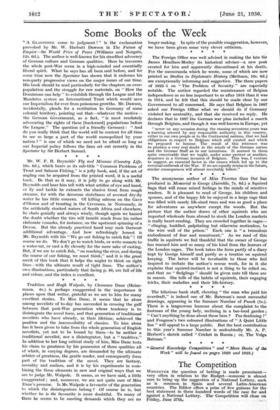Tradition and Hugh Walpole, by Clemence Dane (Heine- mann. 6s.)
is perhaps exaggerated-'in the importance it places upon that writer, grateful as we are to him for many excellent stories. To Miss Dane, it seems that he alone among novelists of to-day has succeeded in crossing the gulf between that post-War generation whose tendency is to disintegrate the novel form, and that generation of traditional novelists who have already, in their lifetime, achieved the position and the inaccessibility of classics. To him alone has it been given to take from the whole generation of English novelists, yet not to be bound by them—to be neither a traditional novelist, nor a disintegrator, but a " traditive." In addition to her long critical study of him, Miss Dane tests his claim to greatness by his possession of three qualities all of which, in varying degrees, are demanded by the ultimate arbiter of greatness, the gentle reader, and consequently form part of the tradition of the novel. They are fantasy, morality and realism, and it is by his experiments in com- bining the three elements in new and original ways that we are to judge Mr. Walpole. - It seems, as we have said, a little exaggerated ; and, moreover, we are not quite sure of Miss Dane's premise. Is Mr. Walpole a favourite of the generation to which the disintegrators belong ? Of course he is, but whether -he is the favourite is more doubtful. To many of them he seems to be meeting demands which they are no
longer Making. In spite of the possible exaggeration, however, we have been-given some very clever criticism. • * * * * •








































 Previous page
Previous page